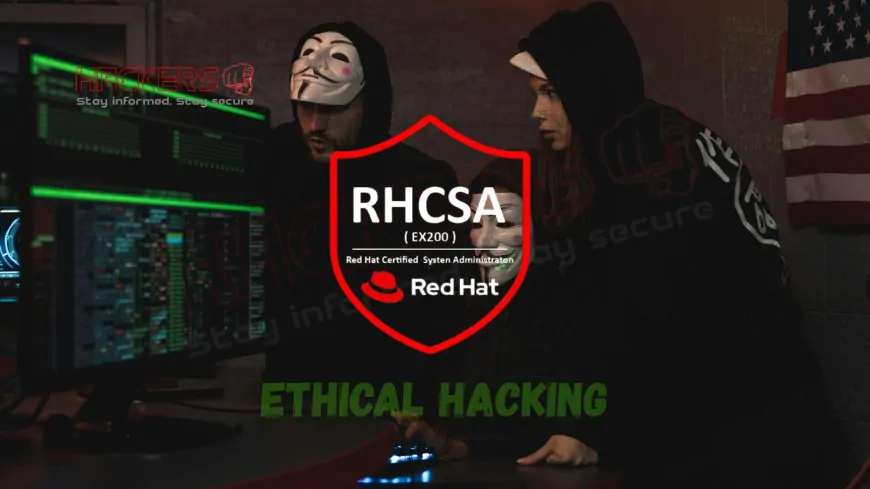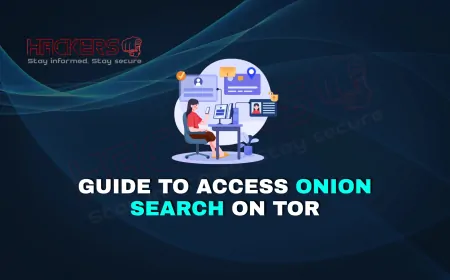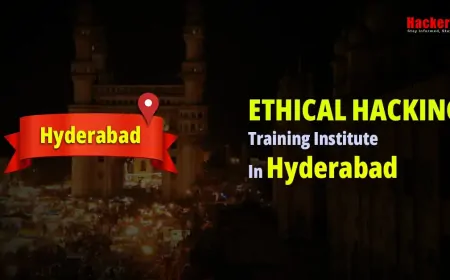Why Should Ethical Hackers Learn Linux Administration via RHCSA?
Imagine being a digital detective, tasked with outsmarting cybercriminals to protect sensitive data. That’s the life of an ethical hacker, a professional who uses hacking skills to find and fix vulnerabilities before the bad guys do. In 2025, with cyber threats like ransomware and phishing escalating, ethical hackers are in high demand. But to truly excel, they need to master Linux, the operating system powering most servers, cloud platforms, and security tools. The Red Hat Certified System Administrator (RHCSA) certification offers a practical, beginner-friendly way to learn Linux administration, equipping ethical hackers with the skills to navigate, secure, and test systems effectively. In this blog, we’ll explore why RHCSA is a must for ethical hackers, using simple language to make it clear for beginners and aspiring pros alike. Ready to unlock your hacking potential with Linux? Let’s dive in!

Table of Contents
- What is RHCSA?
- What is Ethical Hacking?
- Why Linux is Essential for Ethical Hacking
- RHCSA Skills for Ethical Hackers
- Practical Applications in Ethical Hacking
- RHCSA vs. Other Certifications
- Career Benefits for Ethical Hackers
- Why Choose Webasha for the Course
- Conclusion
- FAQs
What is RHCSA?
The Red Hat Certified System Administrator (RHCSA) is an entry-level certification from Red Hat, a leader in open-source software. It focuses on managing Red Hat Enterprise Linux (RHEL), a robust operating system used in servers and clouds worldwide for its security and reliability. Linux is open-source, meaning its code is freely customizable, making it a favorite for secure systems.
RHCSA, tested through the EX200 exam, is hands-on. You perform real tasks—like setting up users, configuring firewalls, or securing files—on a live system, proving you can handle practical challenges. It’s designed for beginners with some IT knowledge, requiring no advanced experience. For a detailed syllabus, check this RHCSA course details blog from Webasha.
For ethical hackers, RHCSA is a goldmine. It teaches you to navigate and secure Linux systems, which are the backbone of most hacking targets. The certification lasts three years, keeping your skills relevant in a fast-evolving field.
What is Ethical Hacking?
Ethical hacking, also called penetration testing, is the art of hacking systems legally to find vulnerabilities before malicious hackers do. Ethical hackers simulate attacks to test defenses, helping companies secure their networks, apps, and data. They use tools like Kali Linux, Metasploit, and Nmap to probe systems, but understanding the target—often Linux-based servers—is key.
In 2025, ethical hackers are critical as cyber threats grow. From ransomware locking data to phishing scams stealing credentials, organizations need pros who can think like hackers to stay one step ahead. RHCSA provides the Linux administration skills to understand and secure these systems, making it a perfect fit for ethical hackers.
Why Linux is Essential for Ethical Hacking
Linux powers over 70% of web servers, most cloud platforms like AWS, and security tools like Kali Linux, making it a prime target for hackers. Ethical hackers need to understand Linux to:
- Navigate Systems: Explore servers to find weaknesses, like misconfigured files or open ports.
- Test Security: Simulate attacks on Linux services, such as web servers or SSH, to identify vulnerabilities.
- Secure Systems: Recommend fixes, like tightening permissions or enabling firewalls, to harden defenses.
- Use Hacking Tools: Run tools like Nmap or Wireshark, which are Linux-based, for network scanning and analysis.
Without Linux skills, ethical hackers are like detectives without a map—they can’t fully understand or secure their targets. RHCSA bridges this gap with practical administration skills.
RHCSA Skills for Ethical Hackers
RHCSA teaches a suite of Linux administration skills that directly support ethical hacking:
- User and Group Management: Use
useraddandpasswdto understand how accounts are created and secured, helping you test for weak credentials or unauthorized access. - File Permissions: Master
chmodandchownto analyze file access controls, identifying vulnerabilities like overly permissive files. - SELinux (Security-Enhanced Linux): Learn to configure SELinux to restrict process actions, allowing you to test if policies prevent exploits like privilege escalation.
- Firewall Configuration: Use
firewalldto manage network traffic, enabling you to probe open ports or recommend firewall rules to block attacks. - Software Management: Apply updates with
yumordnf, helping you assess if outdated software is exploitable. - Log Analysis: Use
journalctlto review logs (e.g.,/var/log/secure), spotting signs of attacks like brute-force attempts. - Backup and Recovery: Create secure backups with
tarandgpg, ensuring data protection during penetration tests.
These skills let ethical hackers understand systems deeply, test vulnerabilities, and propose robust fixes, making RHCSA a perfect complement to hacking certifications like CEH.
Practical Applications in Ethical Hacking
Here’s how RHCSA skills apply to ethical hacking tasks:
- Probing User Accounts: Use
useraddknowledge to test for default or weak accounts, simulating attacker attempts to gain access. - Testing File Vulnerabilities: Check permissions with
ls -lto find sensitive files (e.g.,/etc/passwd) with incorrect access, a common exploit path. - Assessing SELinux: Test SELinux policies with tools like
sealertto see if they block privilege escalation, recommending stronger settings if needed. - Scanning Network Ports: Use
firewalldknowledge to identify open ports (e.g.,firewall-cmd --list-all), then use Nmap to simulate attacks on them. - Checking for Patches: Verify software versions with
dnf list installedto find unpatched vulnerabilities exploitable by tools like Metasploit. - Analyzing Logs: Review logs with
journalctl -u sshdto detect simulated brute-force attacks, helping you recommend monitoring solutions. - Securing Backups: Test backup processes with
tarto ensure data is recoverable, protecting against ransomware scenarios.
These applications make RHCSA skills invaluable for ethical hackers. For real-world insights, see this RHCSA success story.
RHCSA vs. Other Certifications
How does RHCSA compare to other certifications like CEH or CompTIA Linux+ for ethical hackers? Here’s a table:
| Aspect | RHCSA | CEH | CompTIA Linux+ |
|---|---|---|---|
| Focus | Linux administration, security | Ethical hacking, tools | General Linux basics |
| Security Skills | Permissions, SELinux, firewalls | Penetration testing, exploits | Basic permissions, updates |
| Exam Style | Hands-on, performance-based | Multiple-choice | Multiple-choice |
| Best For | Linux system understanding | Hacking techniques | Broad Linux knowledge |
| Prerequisites | Basic IT knowledge | Basic security knowledge | None |
RHCSA’s hands-on Linux focus complements hacking certs like CEH, giving ethical hackers a deeper system understanding. For more, see this RHCSA overview blog.
Career Benefits for Ethical Hackers
RHCSA offers significant advantages for ethical hackers:
- Enhanced Skillset: Understand Linux systems deeply, improving your ability to find and fix vulnerabilities.
- Job Opportunities: Land roles like Penetration Tester, Security Analyst, or Linux Admin with hacking duties.
- Salary Potential: Earn $80,000-$100,000 in the US or ₹4-8 LPA in India, with growth as you add certs like CEH.
- Complementary Skills: Pair RHCSA with CEH or OSCP for a well-rounded hacking profile.
- Industry Demand: Tech, finance, and cloud sectors need Linux-savvy hackers.
These benefits make RHCSA a smart move for aspiring ethical hackers. For career paths, check this Red Hat career guide.
Why Choose Webasha for the Course
To master RHCSA and boost your ethical hacking skills, Webasha Technologies is a top pick, especially in India. With years of experience training thousands, Webasha offers RHCSA courses with hands-on labs that mirror the EX200 exam. Their expert instructors simplify Linux administration, making it accessible for beginners.
Webasha provides flexible learning—online, classroom, or bootcamps—plus affordable fees and job placement support. Their focus on practical skills ensures you can navigate and secure Linux systems like a pro. For exam prep tips, see their RHCSA exam tips blog. Webasha is your launchpad to a thriving ethical hacking career.
Conclusion
RHCSA is a game-changer for ethical hackers, providing essential Linux administration skills to navigate, test, and secure systems. From user management to SELinux and firewalls, it equips you to understand targets and strengthen defenses, complementing hacking certifications like CEH. In 2025, with Linux powering most servers and cyber threats on the rise, RHCSA skills are a must for aspiring hackers. Whether you’re a beginner or an IT pro, this certification opens doors to exciting careers. Ready to hack ethically with Linux? A course with Webasha can get you certified and ready to protect the digital world!
FAQs
What is RHCSA?
RHCSA is an entry-level certification teaching Linux administration, including security skills.
What is ethical hacking?
Ethical hacking is legally testing systems for vulnerabilities to improve security.
Why is Linux important for ethical hacking?
Linux powers most servers and hacking tools, requiring deep system knowledge.
How does RHCSA help ethical hackers?
It teaches Linux administration to navigate, test, and secure systems.
What RHCSA skills aid hacking?
User management, permissions, SELinux, firewalls, and log analysis.
Is RHCSA beginner-friendly?
Yes, it requires only basic IT knowledge.
Can RHCSA improve penetration testing?
Yes, it helps understand and secure Linux systems during tests.
What is SELinux in RHCSA?
A security module restricting process actions to prevent exploits.
Does RHCSA teach firewall skills?
Yes, it covers firewalld to manage network traffic.
Can RHCSA help with hacking tools?
Yes, it aids in using Linux-based tools like Nmap or Metasploit.
What jobs can RHCSA lead to?
Penetration Tester, Security Analyst, Linux Admin with hacking tasks.
How long is RHCSA training?
Typically 3-6 months with consistent study.
Is the RHCSA exam hands-on?
Yes, it tests real tasks like securing systems.
Does RHCSA expire?
Yes, after three years; renew with exams or credits.
How does RHCSA compare to CEH?
RHCSA focuses on Linux administration; CEH covers hacking techniques.
Can RHCSA secure cloud systems?
Yes, it applies to Linux-based clouds like AWS.
Why learn log analysis in RHCSA?
It helps detect attack attempts, like brute-force logins.
Is RHCSA recognized globally?
Yes, Red Hat certifications are valued worldwide.
Can RHCSA complement CEH?
Yes, it adds Linux expertise to hacking skills.
Why choose Webasha for RHCSA?
Webasha offers hands-on training, expert instructors, and job support.
What's Your Reaction?










































































